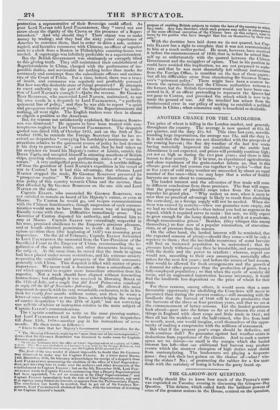ANOTHER CHANCE FOR THE LANDLORDS.
TEE price of wheat is falling in the London market, and generally throughout the country. The average is now quoted at 65s. 9d. .
per quarter, and the duty 21s. 8d. This time last year, notwith- standing large importations, the average was 73s. and the duty Is. It is said that the farmers arc not dissatisfied with the prospects of the coming harvest ; the fine dry weather of the last few weeks having materially improved the condition of the arable land. Abundance is not expected, and prices will probably continue high ; yet not so high as during the two past years ; and there is little reason to fear scarcity. If it be true, as experienced agriculturists and close watchmen of the grain-market inform us, that in this climate good and bad seasons run together in " cycles "—that four or five years of cold rainy weather are succeeded by about an equal number of fine ones—then we may hope that a series of fruitful harvests are now about to commence.
The landed interest and the advocates of free trade will come to different conclusions from these premises. The first will argue, that the prospect of plentiful crops takes from the Corn-law repealer his grand plea. " Why molest us now, when it must be seen that no practical advantage is likely to result from abolishing the corn-duty, as a foreign supply will not be needed. When dis- tress was caused by scarcity—when our granaries were empty, and we had no wheat for market—then indeed you had an argument for repeal, which it required nerve to resist : but now, we fully expect to grow enough for the home demand, and to sell it at a moderate, though remunerative prices." Besides, (they whisper this among themselves,) no fear now of a popular commotion, of starvation- riots, or of pressure from the masses. On the other hand, the landed interest will be reminded, that the expected seasons of plenty—should they come—will be only a reprieve to them ; that the inevitable recurrence of scant harvests will find an increased population to be maintained ; that the pressure lately withstood may then be irresistible, and accompanied with the desire and the power to retaliate : whereas, repeal now would not, according to their own assumption, materially affect prices for the next few years ; and before the return of bad seasons, time would be allowed for fresh arrangements and the growth of a demand for other purposes than the production of grain, from a fully-employed population ; so that when the cycle of scarcity did recur, and an augmented importation became necessary, it would find the landlords less dependent on the price of wheat for their rents.
For these reasons, among others, it would seem that a more favourable opportunity for abolishing the Corn-laws will never be presented than during the present session,—still assuming with the landlords that the harvest of 1840 will be more productive than the harvests of the three or four previous years, and that we are at the commencement of better seasons. Let time landed gentlemen look ahead—peer into the future so far as to discern the state of things in England with short crops and little trade in 1845; and then all but the reckless and the half•ruined, who live from hand to mouth, must, one would imagine, avail themselves of the oppor- tunity of making a compromise with the millions of consumers.
But what if time present year's crops should be defective, and trade continue dull ? No guarantee against bad weather exists m deductions from experience of the climate. And to such a narrow space are we driven—so small is the margin which the landed interest has left—that one additional bad harvest may produce events which the stoutest champion of high duties must shrink front contemplating. The landowners are playing a desperate game : they risk their last guinea on the chance of—what ? win- ning the stakes ? No ; of protracting the rubber for a few more deals with the certainty of losing it before the party break up.


























 Previous page
Previous page